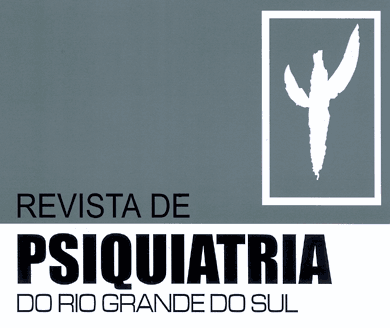BOOK REVIEW
Review of the book entitled Terapia cognitivo-comportamental na prática clínica (Cognitive-behavioral therapy in the clinical practice)
Reseña del libro Terapia cognitivo-comportamental na prática clínica (Terapia cognitivo-comportamental en la práctica clínica)
Eugenio Horácio Grevet
Psychiatrist, UFRGS. Cognitive-behavioral therapist, Instituto Beck. Master's Course in Biological Sciences: Biochemistry, UFRGS. Graduate Course in Psychiatry, UFRGS. Physician, Outpatient Clinic for Attention Deficit Hyperactivity Disorder in Adults, HCPA.
Correspondence Correspondence Eugenio Horácio Grevet Av. Taquara, 586/606 CEP 90460-210 Porto Alegre RS Brazil E-mail: grevet@terra.com.br
It is gratifying to review a textbook on cognitive-behavioral therapy that is both Brazilian and gaucho (from the state of Rio Grande do Sul) because it demonstrates the level to which this field has risen in our locale over the last ten years. Added to this is the fact that to review a book by our colleague, Paulo Knapp is a great pleasure since he is one of the pioneers in the area of cognitive-behavioral therapy in our region. He, together with a number of the co-authors of this book, has been responsible for the training of innumerable cognitive therapists in Rio Grande do Sul.
Several years ago, when I was training in psychiatry, we heard of and read about the new not so new in the USA therapies being used to treat depression: cognitive-behavioral therapies or CBTs, as they are known. We were inclined to practice them and to learn their techniques; however, at that time our training was predominantly informed by psychoanalysis. In general, we had to be autodidactic, import a particular book, participate in study groups or visit a specialized center. For my first contact with CBT techniques I went to the Anxiety Clinic of the Hospital de Clínicas de São Paulo, with Dr. Ligia Ito, in 1995, and at the Chemical Dependency Unit at the Hospital Mãe de Deus, in 1996, with Dr. Ernani Luz Junior (both of whom contributed to the book). I describe my experiences in order to explain how difficult it was for those interested ion CBT to get training.
It was not until 1998 that the first systematic CBT course was launched in our state. Doctors Paulo Knapp and Melanie Pereira organized a course in conjunction with the Beck Institute for a group of 10 people. Both had been trained in Pennsylvania at the Beck Institute and were periodically supervised by telephone by renowned psychotherapists from the institute (some of whom also contributed to this book). The connections between Dr. Paulo Knapp and the Beck Institute bore fruit, giving origin to a CBT training program called the Brazilian Cognitive Therapy Training Program, which was run in 1998 and 1999. Later, with some of the students trained on this program, the Centro de Estudos Luis Guedes organized its CBT course, which is still the model for our state today. I recount this short history in order to demonstrate the efforts that Dr. Paulo Knapp and his colleagues on the book have been making in order to increase the quality of CBT in our state. Terapia cognitivo-comportamental na prática clínica crowns the achievements of these professionals.
The book brings together renowned Brazilian and international professionals and also a new generation of clinicians and researchers in the area from Brazil and Rio Grande do Sul even counting Aaron Beck himself among the participants (without doubt making Paulo very proud).
The authors of the book have taken great care to make the most arid parts of the technique accessible to the readers with success. Clear examples of this can be found in the chapters "O cérebro e a tomada de decisões" (The brain and decision making), by Dr. André Palmini, and "Neurobióloga do comportamento" (The neurobiology of behavior), by Dr. Renato Flores, both wonderful and obligatory reading for all those interested in psychotherapy of whatever type.
The book is divided into three parts: Fundamentos Científicos (Scientific Basis), Prática Clínica (Clinical Practice) and Tópicos Especiais (Special Topics), which take in a wide range of themes and interests. Following a system of dealing with each topic in increasing complexity (something very cognitivist), the book is ideal to be read from start to finish, like a novel.
For those professionals or students who intend to initiate themselves in the technique of CBT, the introductory section, Fundamentos Científicos, gives an overall panorama over the field and the basic concepts of CBT. The second section, Prática Clínica, offers 17 chapters describing techniques in detail, according to the most consecrated and tested indications. Affective disorders, anxiety disorders, chemical dependencies, eating disorders, childhood attention deficit syndrome, schizophrenia and personality disorders are all discussed by clinicians who work with and research these techniques daily. These chapters contain many clinical examples and session transcripts, facilitating application of the technique in the daily practice of the consulting room. They are ideal for professionals who wish to have a textbook to hand to deepen their knowledge and clear up doubts. In the third part of the text (Tópicos Especiais), we find a series of chapters on areas of in development that employ the basics of CBT. Specific areas such as relationship therapy, dietary reeducation, social skills training, and others are described. This part could serve as inspiration for researchers to use CBT in as-yet unexplored fields.
Psychotherapy has always been the strong point of gaucho psychiatry, primarily in the form of psychoanalysis, analysis-oriented psychotherapy and family and relationship therapies. During the last 15 years, gaucho psychiatrists have made a great effort to develop two areas that were little developed in our region: clinical research into psychiatry and BCT. These two areas are now reaching maturity in our state in terms of levels of excellence, which allows us to have psychiatric training that is complete and integrated. Terapia cognitivo-comportamental na prática clínica is, without doubt, a sign of this new and enriching moment.
Correspondence
Publication Dates
-
Publication in this collection
13 Sept 2005 -
Date of issue
Aug 2004


